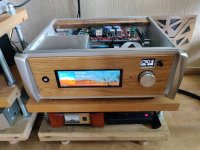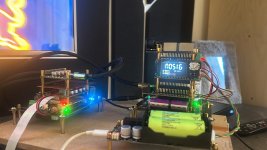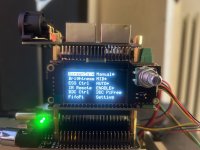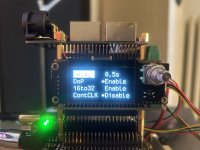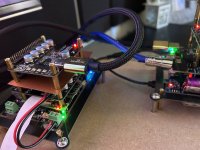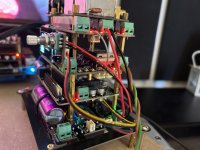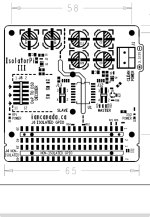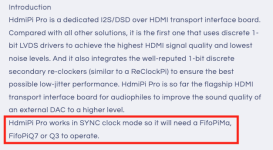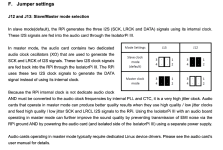Hey guys, I'm loving my rpi streamer/dac stack so much I might want to use it directly with my pc.. I have a douk u2 pro usb to i2s/coax converter so I'd feed the receiverpi ddc with coax or i2s
if I replace the rpi5 in my stack with a ReceiverPi DDC, does it just automatically use whatever input I plug in? meaning i2s or coax, or does it require the monitorpi pro to choose the input in use?
my stack consists of: from bottom to top
ucpi
rpi5
shieldpi 3
fifopi ma 1.5
r2r nos hat dac 2.42
if I replace the rpi5 in my stack with a ReceiverPi DDC, does it just automatically use whatever input I plug in? meaning i2s or coax, or does it require the monitorpi pro to choose the input in use?
my stack consists of: from bottom to top
ucpi
rpi5
shieldpi 3
fifopi ma 1.5
r2r nos hat dac 2.42
Thanks a Lot @dddac and Mario (@zabloc ).Sorry for the delay, it took a bit more time than expected... Mario (@zabloc) did a nice write up how to edit the EEPROM of the RPI5 and add the line
PSU_MAX_CURRENT=5000
As someone who never did this before, I was the Guinee Pig and added extra steps and screenshots where things went too fast for me.
At the end all worked fine and the tutorial was finally edited by Mario. Please find it attached below
I will also add to my blog post about powering the RPI5
This is an old one that I still had lying around and there is nothing else on it other than delta 5v-8 amp.@gizmo3 could you please share referring 8 amp delta power supply product details and link if any. thanks,
Attachments
in my case because of the many external components and a Pi5 is faster than a PI4 it is a better solution for me, plus I also want to run the Os on an NVMe drive.Why are guys switching to a RPi5?
Any specific reason?
Attachments
I am trying to be in sync with the latest options and utilizing the speed and feature set. so exploring...
I've been testing some various DAC related HaTs using a RPi 5. Obviously, it's the latest and fastest RPi todate - using all the latest technology. While it is faster, it also runs hotter. The most notable improvement is with support for the PCIe standard. This allows for the addition (via new HaTs) of NVMe drives. This opens up the ability to boot and run other suitable OS'es, along with fast storage. Now, none of these features are needed to create and run a simple streamer, or create a roon end-point. We'll see a lot more innovation and uses with more powerful RPis 5 in future for sure. IMO, there's no need to replace your earlier generation of a RPi with the 5 - unless you want to use some of its new features.
Why are guys switching to a RPi5?
Any specific reason?
Fast and versatile and I use Gentooplayer... my understanding is, that future updates will be for RPI5 only
good morning. I can't get it to play in any way. Either with i2s or optical. I can't figure out what's wrong.! I have 2 separate bases. One with rpi4 isolator3 and hdmi pipro connected in i2s and on the other side ddc-fifopi q7- dac9038- and trafo lundahl. pipro monitor connected on fifopi q7
Attachments
Just got a confirmation from Gentoo admin that this is incorrect and all currently supported platforms are going to be updated in the future as well.Fast and versatile and I use Gentooplayer... my understanding is, that future updates will be for RPI5 only
optical works but no signal comes out from hdmi pimk2… on volumio I selected i2s audiophonics9028 output. but no signal comes out. I noticed that the isolator pi3 board is different from the one in the manual! the slave master writings are inverted. maybe also the j12 and j13 jumpers!? so that's where the error is!? also I power isolator via 3.3v of purepi but the D3 iso power LED doesn't turn on, is that normal!? only the rpi power D1 LED is on.!good morning. I can't get it to play in any way. Either with i2s or optical. I can't figure out what's wrong.! I have 2 separate bases. One with rpi4 isolator3 and hdmi pipro connected in i2s and on the other side ddc-fifopi q7- dac9038- and trafo lundahl. pipro monitor connected on fifopi q7
Attachments
One obvious question; are you letting the PurePi II powerup and fully charge the batteries? If not, it will typically power-down automatically, and the ISO Power LED(D3) won't light until the 'clean power' is available at J1. I can't tell from your pictures if you're using batteries in the PurePi II. I assume you are. Batteries provide the 3.3 'clean power' at J2. Is the green LED lite at J2 on the PurePi II ?
Correction: I see now that J2 LED is lite, so you should have clean power.
Correction: I see now that J2 LED is lite, so you should have clean power.
Last edited:
yes, the purepi works perfectly. i can't figure out if the isolator is not working or if the card is defective as you can see in the picture before. today i will try to unplug it and power it without the rpi. i will try to put hdmi transmit direct above the rpi to see if it works. is it possible that the problem is the hdmi cable?!? for now i have a simple hdmi 4k 2.0 cable so i will take an i2s cable. but in the instructions ian says that a normal 2.0 cable is fine. maybe i made a mistake in some settings on the pipro monitor..!?
a bit confusing, I don't know exactly what your goal or plan is... but the hdmiPi Pro II does need a mclk input or a reclocker underneath, if you have that then I think you should put the isolator III in master mode.optical works but no signal comes out from hdmi pimk2… on volumio I selected i2s audiophonics9028 output. but no signal comes out. I noticed that the isolator pi3 board is different from the one in the manual! the slave master writings are inverted. maybe also the j12 and j13 jumpers!? so that's where the error is!? also I power isolator via 3.3v of purepi but the D3 iso power LED doesn't turn on, is that normal!? only the rpi power D1 LED is on.!
Attachments
i have hdmi pimk2. The goal is simple, the i2s signal must go out via hdmi cable and enter the ddc receiver. in this configuration there is no need for mclk or anything else, the hdmi cable is enough. at least this is what Ian wrote in his projects. the jumpers are all in the right places. but I repeat I would not want the isolator board to be wrong.
as you explain it now, the isolator board must be in slave mode, at least if the hdmiPi-mk2 does not need a mclk input, if it does need a mclk input then it should be in mater mode.
at least that's what I see.
edit: you have the mk2 is different and can work without mclk.
at least that's what I see.
edit: you have the mk2 is different and can work without mclk.
Last edited:
- Home
- Source & Line
- Digital Line Level
- Asynchronous I2S FIFO project, an ultimate weapon to fight the jitter

